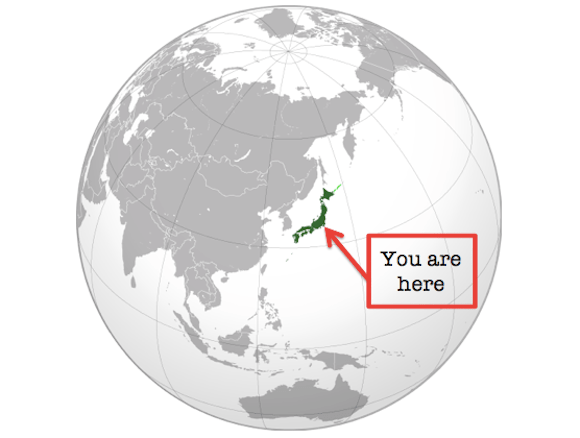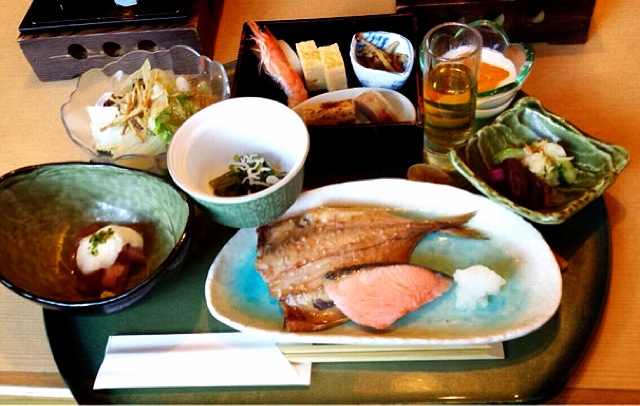living abroad
Today, we present five phases Western expats go through, from arriving fresh off the boat to thinking about retirement, when living in Japan.
Any expat, exchange student, or anybody who has otherwise spent a long period of time abroad will tell you that, while the local food is exciting and fun and delicious for a while, eventually you’ll start to experience intense urges for the comfort foods and products of your native land. For some, these urges may be occasional, mild pangs, but for many, the urges are so strong they can’t resist stocking up on boxes and boxes full of their favorite items from home every time they head back.
Recently, a Japanese female expat who has been living in America for years introduced our sister site to the top 10 items that she likes to stock up on when she visits Japan:
Back when my college days were winding down, my job hunting had turned up two promising leads. One was with a Los Angeles-based fruit exporter, and the other was with a chain of English schools in Japan. As appealing as the idea of having an inside track to some of the world’s finest citrus was, in the end, the siren song of living and working overseas was just too enticing to resist.
Seeing as how that decision eventually led me to some amazing experiences, a wonderful spouse, and a job that occasionally pays me to drink beer, I’d say it was a good call. Still, it’s not all intriguing discoveries and delicious food, as culture shock and homesickness are also parts of leaving the country you grew up in. As much as I love it, living overseas isn’t for everyone, including more than half of new college graduates in Japan, according to one recent survey.
Expats in Japan, you know the feeling: After years of working towards your goal of somehow, someday living in Japan, you finally made it to the land of mochi and Harajuku. But you’re not really living in Japan, no, you’re drowning in it. It wasn’t what you expected it to be (how dare your years of research, whether in school or from anime, deceive you!). And you cry and you curse your naivety for ever thinking you could just pick up and move to such a strange land.
But then one day, you have a clear, identifiable moment when everything seems to come together and you just have to stop and smile to yourself, thinking, “I’m doing it. I’m really doing it.” It’s these little moments that eventually trickle together and without realizing it, you’re walking on water, swapping oyaji-gyagu with the best of them and craving sashimi for dinner. Let’s take a look at what 20 foreigners on Japanese website, Niconico News, identified as a time they really felt like they had gotten the hang of living in Japan.
If you’ve noticed, many of our writers here at Rocketnews24 have crossed the seas to make Japan their second home. Sure, we love the local flavor, but sometimes we just crave a solid meal that smells of our hometown. The same goes for Japanese nationals living abroad.
Even though Japanese cuisine has more or less infiltrated most of the major cities worldwide, domestic foodstuffs and condiments still remain mostly inaccessible and rare in most countries. Japanese blogger Madame Riri shares a list of 10 Japanese foods that can be made at home, no matter where that may be! We’d like to call it the lifesaver list for Japanese abroad, or the inspiration list for non-Japanese who would love an authentic taste of Japan in their own kitchen!





 Starbucks Japan releases first-ever Hinamatsuri Girls’ Day Frappuccino
Starbucks Japan releases first-ever Hinamatsuri Girls’ Day Frappuccino Stay in a Tokyo hotel with a train driver’s seat in the room
Stay in a Tokyo hotel with a train driver’s seat in the room Which convenience store onigiri rice balls are the most popular? Survey reveals surprising results
Which convenience store onigiri rice balls are the most popular? Survey reveals surprising results The results are in! One Piece World Top 100 characters chosen in global poll
The results are in! One Piece World Top 100 characters chosen in global poll A diner’s guide to oden: Japan’s weird-looking, super-popular winter dish
A diner’s guide to oden: Japan’s weird-looking, super-popular winter dish My oh maitake! Japan’s oldest hamburger chain’s new mushroom burger is like eating a forest
My oh maitake! Japan’s oldest hamburger chain’s new mushroom burger is like eating a forest Drift ice in Japan is a disappearing winter miracle you need to see now
Drift ice in Japan is a disappearing winter miracle you need to see now How to make curry in a rice cooker with zero prep work and no water[Recipe]
How to make curry in a rice cooker with zero prep work and no water[Recipe] Ghibli’s Kiki’s Delivery Service returns to theaters with first-ever IMAX screenings and remaster
Ghibli’s Kiki’s Delivery Service returns to theaters with first-ever IMAX screenings and remaster Host your very own Japanese summer festival with these DIY carnival game stands
Host your very own Japanese summer festival with these DIY carnival game stands Highest Starbucks in Japan set to open this spring in the Tokyo sky
Highest Starbucks in Japan set to open this spring in the Tokyo sky Tokyo Skytree turns pink for the cherry blossom season
Tokyo Skytree turns pink for the cherry blossom season Japanese restaurant chain serves Dragon Ball donuts and Senzu Beans this spring
Japanese restaurant chain serves Dragon Ball donuts and Senzu Beans this spring Yakuzen ramen restaurant in Tokyo is very different to a yakuza ramen restaurant
Yakuzen ramen restaurant in Tokyo is very different to a yakuza ramen restaurant Japan Extreme Budget Travel! A trip from Tokyo to Izumo for just 30,000 yen [Part 1]
Japan Extreme Budget Travel! A trip from Tokyo to Izumo for just 30,000 yen [Part 1] Japan has only one airport named after a samurai, so let’s check out Kochi Ryoma【Photos】
Japan has only one airport named after a samurai, so let’s check out Kochi Ryoma【Photos】 Japanese drugstore sells onigiri at pre-stupid era prices, but how do they compare to 7-Eleven?
Japanese drugstore sells onigiri at pre-stupid era prices, but how do they compare to 7-Eleven? Burning through cash just to throw things away tops list of headaches when moving house in Japan
Burning through cash just to throw things away tops list of headaches when moving house in Japan Starbucks Japan releases new sakura goods and drinkware for cherry blossom season 2026
Starbucks Japan releases new sakura goods and drinkware for cherry blossom season 2026 Japan’s newest Shinkansen has no seats…or passengers [Video]
Japan’s newest Shinkansen has no seats…or passengers [Video] Foreigners accounting for over 80 percent of off-course skiers needing rescue in Japan’s Hokkaido
Foreigners accounting for over 80 percent of off-course skiers needing rescue in Japan’s Hokkaido Super-salty pizza sends six kids to the hospital in Japan, linguistics blamed
Super-salty pizza sends six kids to the hospital in Japan, linguistics blamed Starbucks Japan unveils new sakura Frappuccino for cherry blossom season 2026
Starbucks Japan unveils new sakura Frappuccino for cherry blossom season 2026 Foreign tourists in Japan will get free Shinkansen tickets to promote regional tourism
Foreign tourists in Japan will get free Shinkansen tickets to promote regional tourism The 10 most annoying things foreign tourists do on Japanese trains, according to locals
The 10 most annoying things foreign tourists do on Japanese trains, according to locals Take a trip to Japan’s Dododo Land, the most irritating place on Earth
Take a trip to Japan’s Dododo Land, the most irritating place on Earth Naruto and Converse team up for new line of shinobi sneakers[Photos]
Naruto and Converse team up for new line of shinobi sneakers[Photos] Is China’s don’t-go-to-Japan warning affecting the lines at a popular Tokyo gyukatsu restaurant?
Is China’s don’t-go-to-Japan warning affecting the lines at a popular Tokyo gyukatsu restaurant? Survey asks foreign tourists what bothered them in Japan, more than half gave same answer
Survey asks foreign tourists what bothered them in Japan, more than half gave same answer Japan’s human washing machines will go on sale to general public, demos to be held in Tokyo
Japan’s human washing machines will go on sale to general public, demos to be held in Tokyo Starbucks Japan releases new drinkware and goods for Valentine’s Day
Starbucks Japan releases new drinkware and goods for Valentine’s Day We deeply regret going into this tunnel on our walk in the mountains of Japan
We deeply regret going into this tunnel on our walk in the mountains of Japan Studio Ghibli releases Kodama forest spirits from Princess Mononoke to light up your home
Studio Ghibli releases Kodama forest spirits from Princess Mononoke to light up your home Major Japanese hotel chain says reservations via overseas booking sites may not be valid
Major Japanese hotel chain says reservations via overseas booking sites may not be valid Put sesame oil in your coffee? Japanese maker says it’s the best way to start your day【Taste test】
Put sesame oil in your coffee? Japanese maker says it’s the best way to start your day【Taste test】 No more using real katana for tourism activities, Japan’s National Police Agency says
No more using real katana for tourism activities, Japan’s National Police Agency says My oh maitake! Japan’s oldest hamburger chain’s new mushroom burger is like eating a forest
My oh maitake! Japan’s oldest hamburger chain’s new mushroom burger is like eating a forest Drift ice in Japan is a disappearing winter miracle you need to see now
Drift ice in Japan is a disappearing winter miracle you need to see now How to make curry in a rice cooker with zero prep work and no water[Recipe]
How to make curry in a rice cooker with zero prep work and no water[Recipe] Ghibli’s Kiki’s Delivery Service returns to theaters with first-ever IMAX screenings and remaster
Ghibli’s Kiki’s Delivery Service returns to theaters with first-ever IMAX screenings and remaster Host your very own Japanese summer festival with these DIY carnival game stands
Host your very own Japanese summer festival with these DIY carnival game stands 7-Eleven Japan now sells fresh-fried doughnuts, but are they any good?【Taste test】
7-Eleven Japan now sells fresh-fried doughnuts, but are they any good?【Taste test】 How to turn your leftover instant ramen broth into delicious chawanmushi Japanese egg custard
How to turn your leftover instant ramen broth into delicious chawanmushi Japanese egg custard The fish in rural Fukui that rivals Japan’s most auspicious sea bream
The fish in rural Fukui that rivals Japan’s most auspicious sea bream Family Mart ups its convenience store food game with special burger from beef bowl chain Matsuya
Family Mart ups its convenience store food game with special burger from beef bowl chain Matsuya Japanese convenience store’s new “phantom” cream doughnuts are sinfully good
Japanese convenience store’s new “phantom” cream doughnuts are sinfully good Our reporter is willing to die on the pseudo-Italian restaurant Olive Hill
Our reporter is willing to die on the pseudo-Italian restaurant Olive Hill Abysmal viewer ratings for Pokémon anime series does not worry its broadcaster the slightest bit
Abysmal viewer ratings for Pokémon anime series does not worry its broadcaster the slightest bit